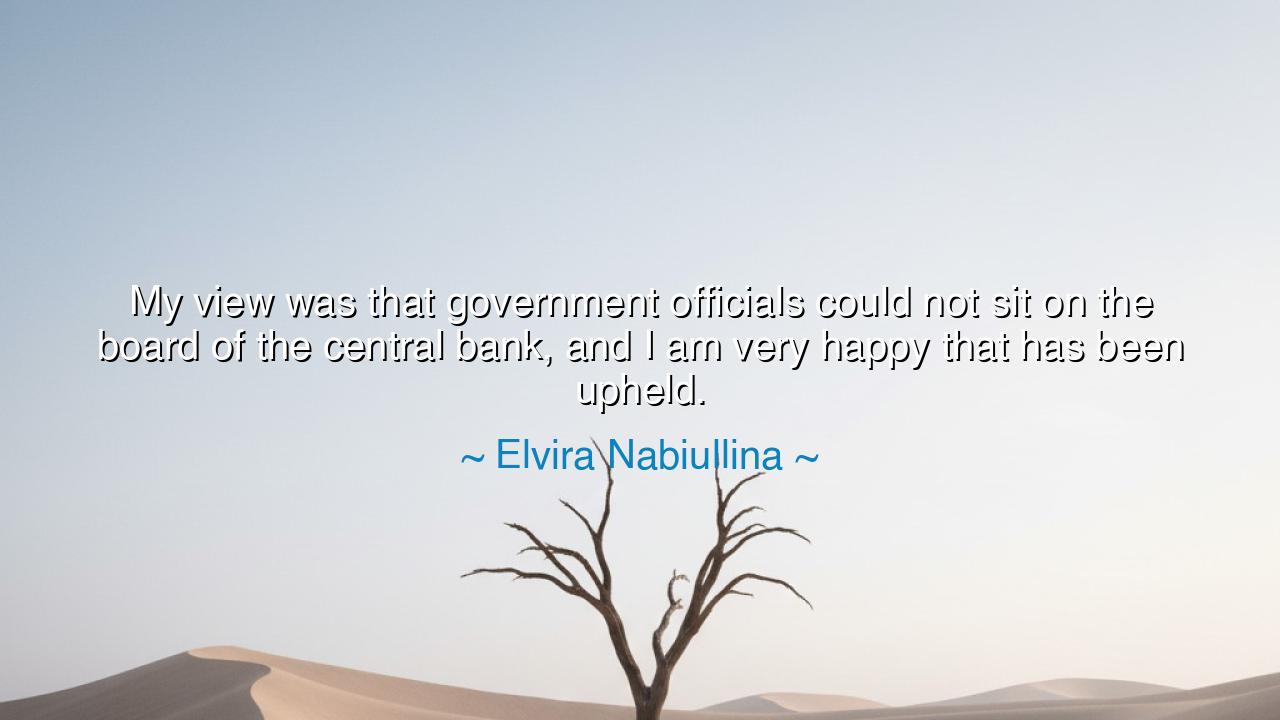
My view was that government officials could not sit on the board
My view was that government officials could not sit on the board of the central bank, and I am very happy that has been upheld.






In the world of power and finance, where gold and law intertwine like serpents in the dark, there comes a voice of rare clarity and restraint. Elvira Nabiullina, the distinguished Governor of the Central Bank of Russia, once declared: “My view was that government officials could not sit on the board of the central bank, and I am very happy that has been upheld.” To many, these may sound like the words of a technocrat, cool and administrative. But in truth, they carry the weight of a timeless principle—the separation of power from temptation, and the guarding of wisdom from the reach of politics. Her words speak to the eternal struggle between independence and control, between the voice of reason and the hand of authority.
The ancients understood that every realm of power, once concentrated without boundary, drifts toward ruin. The central bank, in its modern form, is not merely a vault of money, but the heart that circulates the lifeblood of a nation’s economy. If this heart falls into the grasp of short-term politics, it beats not for stability but for ambition; it serves not the people, but the rulers of the moment. Thus, when Nabiullina rejoiced that the independence of the central bank was preserved, she rejoiced in something greater than policy—she rejoiced in the endurance of order, reason, and balance against the chaos of unchecked power.
This belief, though spoken in the modern world, finds its roots in the wisdom of ages past. The philosopher Aristotle warned that the health of a state depends upon the division of duties—that no single body may judge, rule, and manage wealth, lest corruption take root. In the same spirit, the founders of modern economies understood that money, being the vessel of all enterprise, must be guarded from the flames of politics. For rulers, in their hunger for glory, will often spend what the people do not have, promising comfort today and leaving ruin tomorrow. It is the independent steward—the wise banker, the careful economist—who must hold the line, protecting the currency as priests once protected the temple flame.
There is an old story, from the days of the Roman Republic, of the aerarium, the public treasury. In times of war or crisis, senators would clamor to open it, to seize what lay within and use it for their own causes. But the law placed the keys in the hands of the quaestors, officials sworn not to the Senate, but to the state. One such quaestor, when ordered by a consul to hand over the treasury unlawfully, refused—even at the cost of his position. His defiance preserved the republic’s faith in the rule of law over the rule of men. So too does Nabiullina’s principle echo this ancient courage: that governance requires restraint as much as it requires will.
Her statement came during a time when many nations, shaken by crises and the allure of populism, sought to tighten their grip on central banks—to make them instruments of policy rather than guardians of stability. But Nabiullina, quiet yet resolute, stood for a deeper truth: that a nation’s wealth must serve its people, not its politics. When she said, “I am very happy that has been upheld,” she spoke with the satisfaction of one who had defended a sacred trust—the independence of economic judgment from the clamor of power. For where the mind of money is free, the people may prosper in peace; but where it is enslaved, inflation, corruption, and decay soon follow.
The lesson is eternal: boundaries preserve harmony. Just as the river needs its banks to flow strong and true, so must institutions be kept distinct, each fulfilling its purpose without encroachment. The legislator may make laws, the minister may guide policy, but the steward of finance must remain impartial—guided by reason, not decree. The people who understand this wisdom will not demand from their governments miracles of spending, but prudence of stewardship; they will not envy the independence of the banker, but cherish it as the safeguard of their bread and their future.
So, my children of the modern age, take heed of this teaching. Guard independence wherever it lives—whether in the courts, the press, or the councils of finance—for independence is the root of justice and truth. Do not let the passions of the moment consume the principles that ensure tomorrow’s peace. Be like Elvira Nabiullina, steadfast yet humble, defending with calm courage what others take for granted. For to protect independence is to protect integrity, and to protect integrity is to preserve the soul of a nation.
Thus, remember always: power unrestrained consumes itself, but power bound by wisdom endures. When governments respect the freedom of institutions, the people reap the harvest of stability and trust. And when leaders, like Nabiullina, rejoice that such principles are upheld, they remind us that true strength lies not in domination—but in discipline, in humility, and in the quiet triumph of order over chaos.






AAdministratorAdministrator
Welcome, honored guests. Please leave a comment, we will respond soon